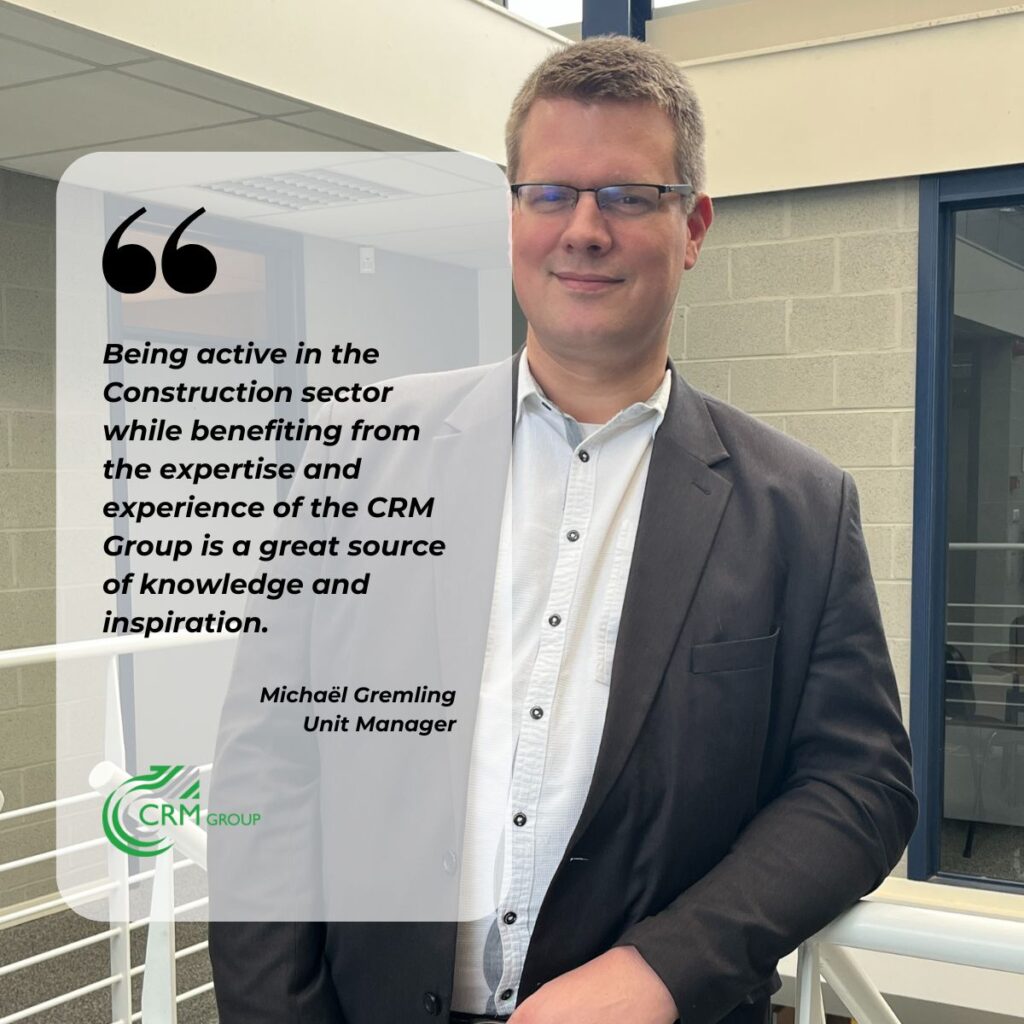Meet Our Experts: Michaël Gremling

The Construction industry plays vital role in society, both in terms of economical backbone and societal solutions. Although part of this sector is globalized at the international level, it contributes significantly to the local activity of Regions and Communities.
Due to its environmental impact and production of large quantities of waste, the Construction sector must adapt to new eco-socio-economic challenges and is undergoing major changes. Research and Development (R&D) is developing disruptive solutions to stimulate positive changes in this market.
Can you introduce yourself, tell us how long you’ve been working at CRM Group, your career and explain your current role?
I graduated as a Civil Engineer in 2005, specializing in buildings and civil engineering structures. After graduation, I joined the Arcelor Steel Company in Europe that became ArcelorMittal shortly afterwards. In 2011, I moved to the CRM Group and continued to work for the steel and construction industries with customers in Europe, Latin America and the USA.
I’m a Unit Manager (department head) within the CRM Group, responsible for research and development activities for clients in the steel and construction markets. On a daily basis, I combine two missions: first, I work closely with my clients to establish and facilitate business collaborations. Second, I am a member of the company’s management committee and therefore coordinate the operational activities of my department, working with the internal financial, safety, and legal departments.
Our two main ongoing challenges are to bring more scientific value to a very conservative market and to provide the company with a multi-year financial viability plan for the department while it operates in a highly competitive market where players struggle to maintain very tight margins. This is why it is essential to understand the needs and interests of stakeholders.
You said you work for the Construction industry which is a rather special area within the CRM Group. Can you tell us more about it?
Throughout the last 75 years, the CRM Group has developed unique and strong expertise in materials, processing of materials and various types of coatings. Our Company has developed breakthrough solutions up to industrial successes. The CRM Group is recognized in the market as a key player in the development of new technologies for the steel industry.
Being active in the Construction sector while benefiting from the expertise and experience of the CRM Group is a great source of knowledge and inspiration. It helps to bring more valuable solutions to our customers from material selection to final site erection of the solution. Furthermore, it is an unique opportunity to conduct reverse engineering and provide relevant indications on material changes that will help the Construction industry to shape a better future.
I therefore see the opportunity to work for the Construction market within the CRM Group as an excellent opportunity to bridge the gap between upstream decisions on material production and downstream site decisions such as fabrication, transportation and erection of structures for building and civil engineering applications.
What are the main challenges in the modern Construction industry?
The future of the Construction industry requires multiple and major innovations to offer more perspectives to society but also – and above all – provide people with affordable and more respectful solutions for the environment.
The biggest challenge for this sector is certainly reducing its negative environmental impacts. The Construction must drastically decrease its production of wastes and its contribution to pollution. In addition to costs and structural performance, estimating CO2 equivalent emissions is more and more often demanded to identify less polluting solutions. Although sometimes controversial, this method is a good start.
Another strategic challenge is related to raw materials which are increasingly expensive and critical. Moreover, they are now a source of conflicts at the international level. It is therefore absolutely essential to use raw materials sparingly and develop innovative solutions using less critical materials and offering better recycling and reuse options.
Industrialization will also represent a major transformation in the Construction sector. Faced with worsening impacts on mobility and urban nuisances, it is important to develop solutions that minimize problems on busy roads and urban areas. Prefabrication of products, rather than very long site operations, will become more and more popular and necessary. Industrialization will also help address the challenges associated with the growing shortage of skilled workers.
Implementing digitalization will be an interesting challenge for the Construction market. Compared to many other industries, the Construction industry is probably one of the least prepared for the widespread adoption of digitalization, although digitalization is essential fore many reasons; predictive maintenance and energy savings probably being the two first drivers.
I will conclude my answer by saying that companies willing to invest in more modern technologies and solutions will contribute to shape the future, while companies sticking to traditional methods without any consideration for innovation must prepare for dark days.
How can you make a difference? Why customers are willing to work with your teams?
Our key strength is to be able to combine theory with laboratory and full scale testing. We don’t only develop the solution on paper; we also prototype the solution, test it and define best industrial process to manufacture and erect the system.
This dual approach, that combines theory and testing, is a key difference compared to most of our competitors who are generally active in either calculation or testing but rarely both.
Our constant presence on the market also help us to find right insights to bring value to our customers.
We combine structural engineering and calculation together with advanced numerical simulations, mechanical testing including extreme conditions (fire, impact, bursting, cryogenic, very high pressure…). We have been involved in various developments with customers from static structures as warehouses to accidental dynamic situations such as vehicle impacts or fire in multi-floor buildings.
I would like also to emphasize that our international cooperations also help us to always be aware of best practices and to propose to our customers solutions up to date with best state-of-the-art know-how. This is a pretty unique offer, given that Construction industry is very often focused on local practices.
It is the second time you’ve mentioned international cooperation : but how to combine international cooperations and local viability?
I think it is first important to clearly state that my vision of international cooperation is absolutely not just limited to seeking for the cheapest production elsewhere in the world and then moving goods, transferring value and destroying local business.
My daily desire is to establish international cooperation to strengthen local economies. Sharing best practices and know-how internationally is, in my opinion, absolutely necessary to effectively address the challenges facing the Construction industry. We simply cannot ignore what competent people do in other parts of the world. However, this doesn’t mean sacrificing local economies. Local economies can be – and must be – involved in international cooperation.
Coming back to your Department ; what is – according to you – the essential key skill that makes the difference?
We have a large number of equipment and computing capabilities. But what really makes the difference are our talented and committed people. Nothing would be possible without the women and the men bringing their passion, their expertise and their willingness to change things.
I can buy new equipment in a few days and we can develop new capabilities in a few weeks. But it takes years to build high-performing work teams that will make the difference. This is therefore our most valuable skill, and it deserves daily attention.
Lastly, what advice would you give to a young student entering this field today ?
I would tell her or him that passion is probably as important as technical expertise. The construction industry is evolving and changing; it therefore offers many exciting opportunities to shape the construction of tomorrow.
I would actually address my message to young students who are still hesitant to enter the Construction sector. Construction is still often perceived as a dirty, arduous, and exhausting profession. However, modern construction requires a wide range of skills, which you will definitely enjoy. This can range from manual labor to intellectual contribution.
Moreover, the sector is seriously running out of skilled workers (both manual and intellectual) and therefore offers many job opportunities.
Finally, I would like to tell young women that the Construction industry is not just for men. There is a strong a growing demand for talents and specialists. What will actually make the difference is your motivation, your commitment and your expertise. So don’t hesitate and join the Construction industry.

